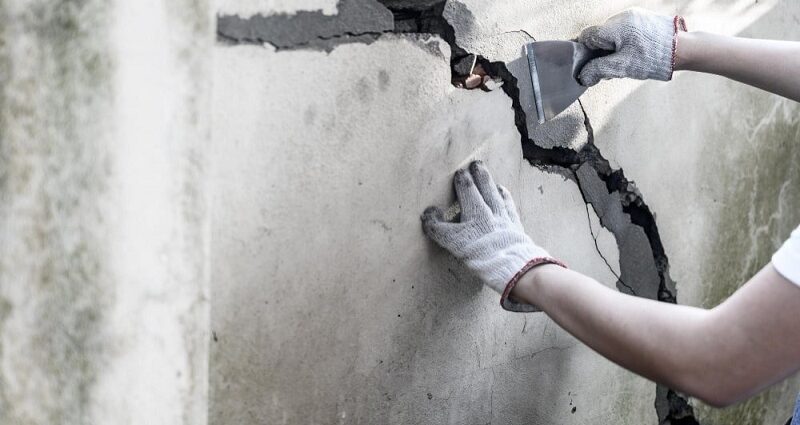Restoring damaged concrete slabs involves creating long-lasting, resilient surfaces. Experts in concrete surface repairs utilize advanced techniques to prepare surfaces meticulously. They address underlying issues like moisture or instability, preventing future damage and extending the concrete’s lifespan. Additionally, by reinforcing structural integrity with methods like form and pump techniques, these professionals ensure your concrete slabs can withstand increased loads and environmental stresses.
1. Expert Floor Assessment
A professional assessment process is essential when repairing a damaged concrete surface, as some issues may not be obvious. Experts will help detect underlying concrete problems like subsurface cracks, moisture intrusion, or crazing, which could compromise the repair’s effectiveness if left unaddressed.
By leveraging their expertise, you ensure that the repair addresses the visible damage and tackles any hidden issues, leading to a more durable and long-lasting solution. A thorough approach is vital to extending the lifespan of your concrete surfaces and preventing costly future repairs. However, hiring a concrete repair expert specializing in concrete coatings, epoxy, and repair services is crucial to ensure a comprehensive solution for your flooring and walls.
2. Comprehensive Surface Cleaning and Profiling
Surface preparation through cleaning and profiling helps undertake effective concrete repair by facilitating optimal adhesion and long-term durability. Cleaning involves removing dirt, debris, oil, and other contaminants to prepare a clean base for repair materials. A clean surface prevents adhesion issues and enhances the new bond between the existing concrete and the new repair layer. By addressing these contaminants, you also reduce the risk of future damage and increase the longevity of the repair.
Profiling follows, creating a rough texture on the concrete to enhance the mechanical bond between the existing surface and the repair material. Applications like diamond grinding, scarifying, and shot blasting create the desired surface texture. Thorough surface preparation helps enhance the efficiency of the repair process, prevent adhesion issues, and ensure a more durable and cost-effective repair.
3. Addressing Underlying Issues
Before getting into actual repair work, it’s crucial to deal with underlying issues. Such may include moisture removal and addressing cracks, spalls, or other defects. Properly managing these factors ensures that the repair material adheres correctly and that the repair will be durable. Addressing these foundational problems is essential for a successful concrete repair that goes beyond surface fixes.
Identifying and resolving issues like moisture infiltration, soil instability, and inadequate drainage helps to prepare the surface properly and prevent future damage. Effective moisture removal is vital to ensure adhesion while repairing underlying defects to create a stable base for the repair. By tackling these deeper issues, you prevent further damage and significantly extend the lifespan of the repaired concrete, resulting in a more durable and resilient surface.
4. Structural Strengthening
Significant damages on concrete floors and walls can negatively affect property integrity, compromise load-bearing capacity, and increase susceptibility to environmental stresses. By reinforcing structural integrity with form and pump techniques, these professionals ensure your concrete slabs can withstand increased loads and environmental stresses.
Structural strengthening techniques such as injecting high-strength materials and reinforcing materials like fiberglass and carbon fiber can help address such structural weaknesses before undertaking the final repair. These methods restore and enhance the slab’s strength, ensuring it can withstand greater loads and resist future damage.
5. Apply The Final Repair Materials
After properly preparing and restoring the surface integrity, it’s time to apply the repair materials or coatings. Experts in concrete repairs will assess your needs, surface condition, and budget to choose the most suitable concrete coating solution. Options may include liquid flooring applications, epoxy floor systems, or other specialized coatings tailored to enhance durability and aesthetics. A careful selection ensures optimal performance and longevity of the repaired surface.
However, hiring an expert is crucial for considering factors like proper curing, adequate steel reinforcement, and appropriate coating selection. These elements are essential for ensuring the long-term durability and strength of the repair, preventing future issues, and achieving a high-quality finish that withstands environmental stresses.
In conclusion, choosing a reliable concrete repair expert is a gateway to high compliance standards while ensuring a durable, long-lasting finish. A professional with a comprehensive scope of solutions can address underlying issues, select appropriate materials, and follow best practices, ultimately delivering a repair that meets your needs while standing up to environmental and structural demands.

